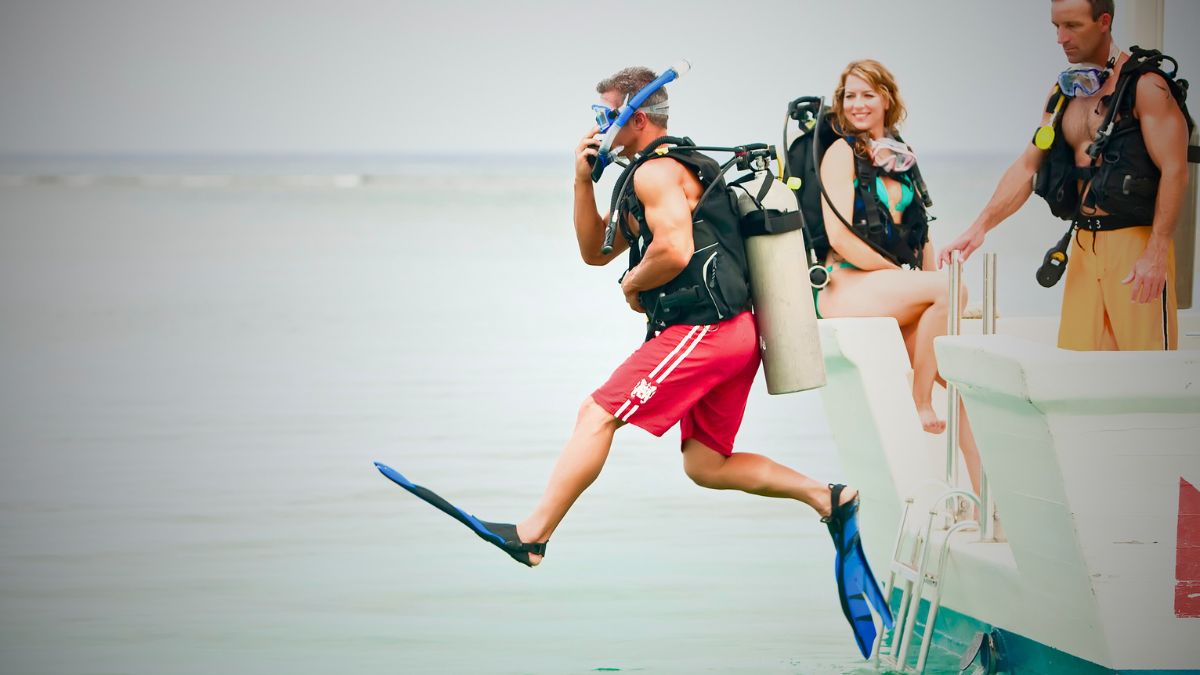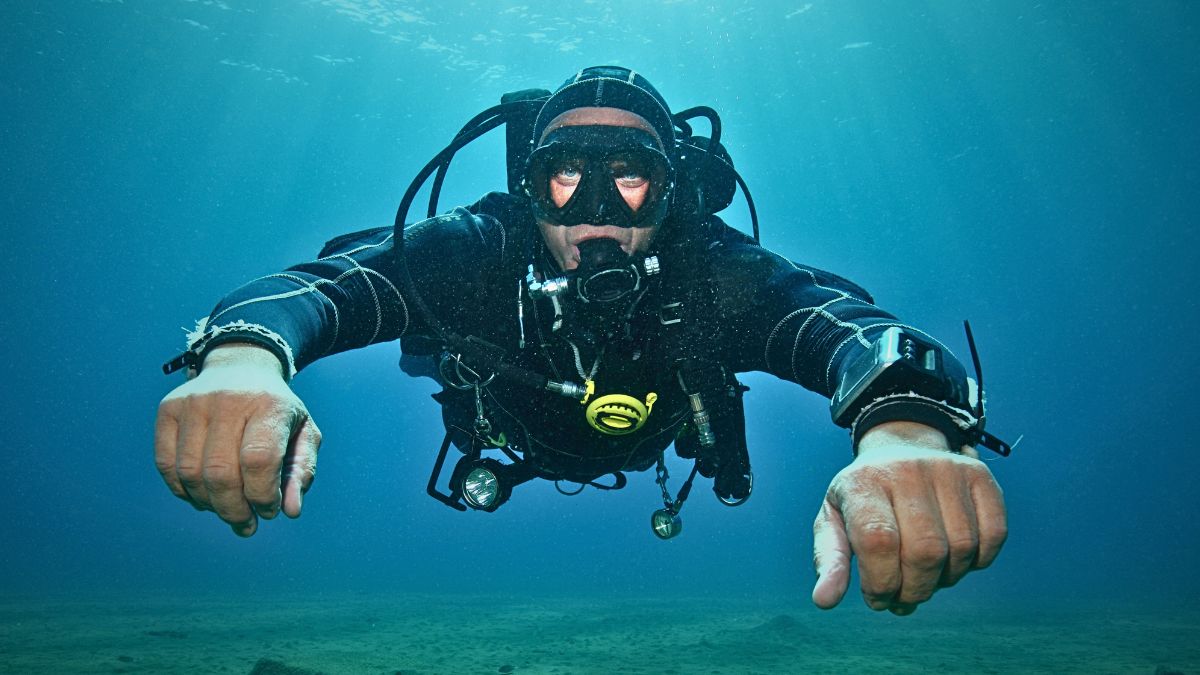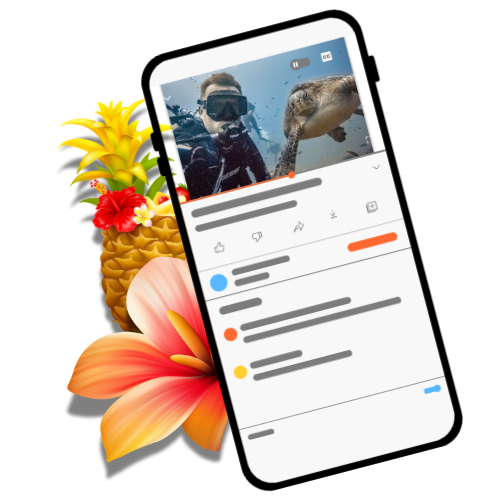Diving at night has a completely different character than diving during the day. Night diving definitely has a taste of mystery and anxiety. At night, you have the opportunity to explore the nocturnal underwater life, often much richer than during the day. For many divers, diving at night is much more attractive than in the light of day.
If you’ve seen abundant underwater life while diving during the day, imagine what the underwater kingdom might look like at night. Other species of animals come out to feed, large predators appear and definitely the underwater world does not sleep at night. All this is definitely worth seeing to get an idea of the complexity and beauty of the underwater world.
What can you find in this post?
Definitely, diving at night is different and requires a little different preparation and additional equipment. Remember that visibility will be very limited at night, not only underwater but also on the surface. Today I will discuss some aspects to think about when preparing for a night dive.
Despite the appealing vision of diving at night, you must remember that your safety is paramount and you should prepare well for such a dive. Definitely do not try to do it alone, even if you already have a scuba diver’s license. Simply put, this type of diving is specific and it is better to start it under the guidance of an instructor.
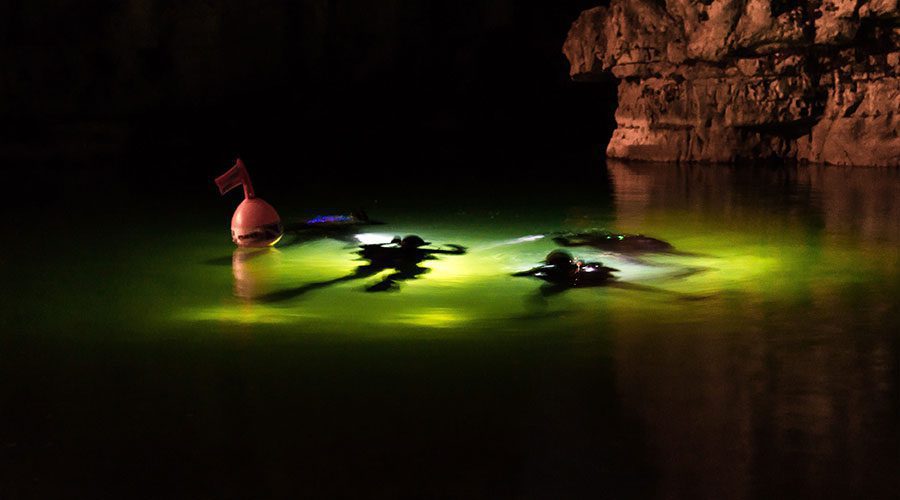
Diving at night – the basics
Let’s start with basic safety rules, because night diving involves dangers that we don’t have during the day. Losing our way or going into places we hadn’t planned are things we need to anticipate. The general rule is that we do night dives in places we already know. And additionally in the company of experienced colleagues or instructors. If you don’t have much experience in night diving yourself, then look for someone more experienced. Definitely do not drag someone who has even less experience than you to such a dive.
Often at night it is hard to believe that we are in a place we know so well, because everything seems new and completely different. So, don’t try to be a bigger smarty-pants than you are and don’t put yourself and others at unnecessary risk.
Why go night diving?
At night we see only what we illuminate with a flashlight, the field of vision narrows and we see much more detail, the night world is beautiful, its mystery is captivating. Anyone who has ever had the opportunity to be in the forest after dark knows that the forest never sleeps. Sunset, which ends the period of activity for some animals, for many others is the signal to start it.
The roar of owls, the crackle of breaking branches under the paws of hunting predators, or the concerts of crickets that accompany, especially on summer nights. It is no different underwater, and although it may surprise many, it is the night dives that are among the most interesting. Night diving is, by definition, diving between sunset and sunrise. However, if you really want to see how the world changes underwater, wait at least 2 hours after sunset.
What gear do you need?
Diving equipment on this type of dive is not fundamentally different from ordinary dive kit. During a night dive you will use all the equipment you use during the day. Of course, in addition, you will need a good light source.
In general, all divers on a night dive should be equipped with two independent light sources. The main one, used during the dive, and a backup one in case the main light fails. It’s also a good idea to equip yourself with small chemical lights that can be attached to your BCD or dive tank so that your position is constantly visible.
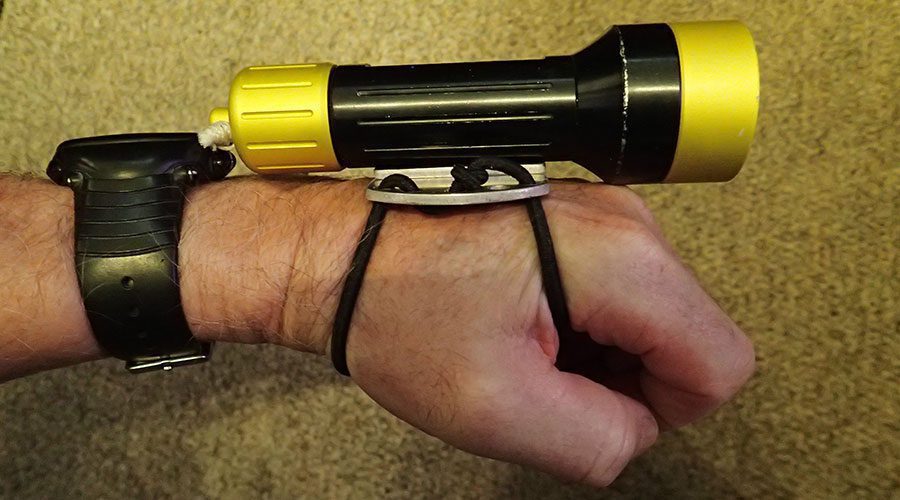
Is it safe to dive at night?
Is diving at night dangerous? I would say just as dangerous as during the day. Diving in general has risks because it is a higher-risk activity. When diving at night, there are several elements that come into play that can potentially cause problems. Lack of proper communication is one cause of problems. But also remember that disorientation and light problems can even lead you to have a panic attack, which is never good underwater. Especially if you don’t have much experience. That’s why I stress again – do it with the right company.
Another danger I have to mention here is that you are hardly visible in the water. I can’t imagine night diving in particularly busy waterways, but consider that once you surface, an oncoming boat may not see you. Therefore, under no circumstances should you turn off your light source until it is safe to do so on board the boat or on land.
Is diving at night scary?
Fear is a normal thing, especially in the face of new and unknown experiences. But fear is very necessary because it’s what keeps you safe and encourages you to be cautious. But on the other hand, irrational fear can also be debilitating and can limit you. The same is true for diving as for any other high-risk activity.
Is diving at night different? Yes, but is it somehow particularly more dangerous? I wouldn’t say so. Definitely jumping into the water at night will be a great experience, especially the first time. Therefore, as I mentioned earlier, don’t do it without training or with inexperienced company. However, if you keep these common sense safety rules, there is really nothing to be afraid of. And believe me, diving at night will remain in your memory for a long time. Especially the first one.
Can open water divers dive at night?
You are surely wondering what level you need to be at to try night diving. The answer may surprise you, because you can already try this specific type of diving after completing the PADI Open Water Diver course. You have two or even three options here.
First, you can do the PADI Night Diving specialty course. This course consists of doing 3 training night dives and ends with a specialized license. Alternatively, you can ask the dive center of your choice if it is possible for one of the dives to be a night dive as part of your PADI Advanced Diver course. The last option is to do an adventure dive with an instructor.
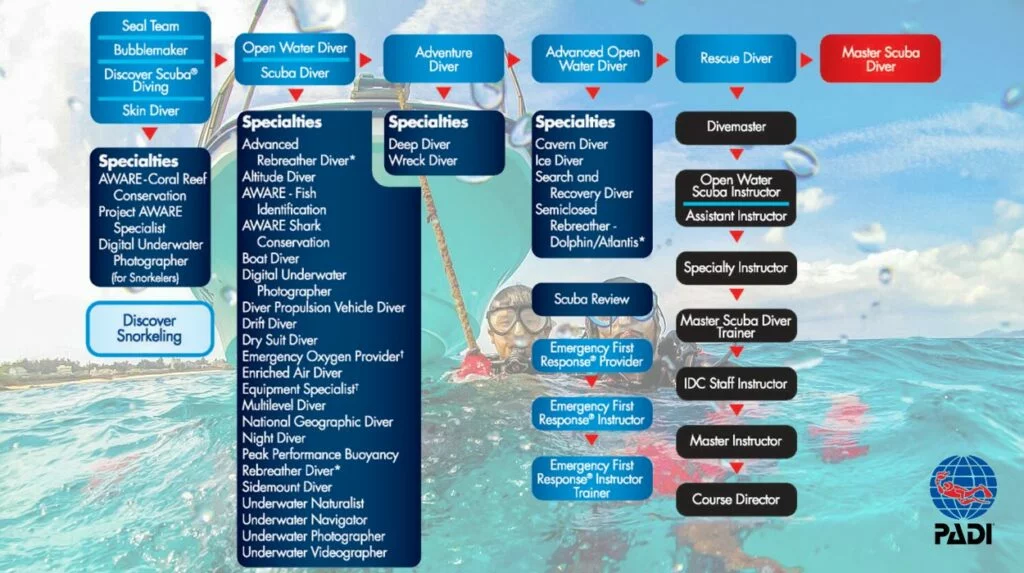
What can you see during a night dive?
Diving at night gives you the opportunity to see creatures that you can’t see during the day, as they have a decidedly nocturnal lifestyle. Many of these nocturnal creatures come out to hunt only after sunset, while they spend the day in hiding. Many sea creatures such as squid, octopus, shrimp, eels or sea urchins are more active at night.
Larger sea creatures such as manta rays and sharks also activate after sunset and can be seen in real action. On the other hand, all creatures that are active during the day sleep at night hidden among the rocks or coral. Therefore, this is also a great opportunity to observe fish up close, or a turtle sleeping somewhere.
Stunning bioluminescence of plankton
Ok this is probably the best thing you can experience on a night dive! Phosphorescent plankton that floats around you. When you wave your arms, this bioluminescent plankton will react by producing light and this will create amazing visual effects. If you cover the flashlight with your hand for a moment, the effect will be even more amazing. You will be a bit like from the movie Avatar!
Dive signals during a night dive
Another important issue that we need to address is how to communicate with partners. Of course, you already know the diving signals and how to communicate underwater. However, during diving at night the matter gets a little more complicated because in the dark, it will be difficult to see the signs shown in the normal way. So you need to illuminate the signs you are showing so your partners can see what you want to tell them.
The first rule of night communication and using a dive light underwater is to never point it at another diver’s face. This may attract his attention, but all he will see is a speck of bright light coming from your direction. This will certainly blind him for a long while, causing him to be annoyed to say the least.
So how do you properly illuminate the signs you are showing? You show the signal with one hand, and use a flashlight to illuminate it from the outside, directing the light beam toward your body. In this way, your hand will be properly illuminated and the signal will be understood, while not blinding your partner.
As for the most recognizable diving signal, the OK, it can also be shown in other ways. Simply stagger the circles with a flashlight, thus letting your partners know that you are OK.

Navigation during a night dive
And now the most important issue – navigation when diving at night. The truth is that underwater navigation often causes problems for beginners (and not only) divers. Especially when visibility is poor or when there are not many landmarks underwater. Hey, let him be the first to throw a stone who has never accidentally swam to a place where there was only sand and nothing else…. It does happen. But believe me a night dive will test if you are really good at it. Do you know how many times at night I’ve wondered why this rock is here when I’m sure it’s somewhere else during the day? lol…. 🙂
Therefore, as I mentioned earlier, night dives are more likely to be planned in places you already know or dive with someone who has such experience. Before jumping into the water, try to get an idea of where you are, where north is, what direction you should swim and what you plan to see. Because believe me, that underwater everything will look different. The general advice for navigation is simple – have a compass with you and learn to use it.
Let’s recap – is diving at night for you?
YES!!! Do you remember the thrill before your first ever dive? Or do you remember how you felt after passing a diving course? Diving at night is sure to give you a similar kick and open up a new world and new possibilities. If you get the chance, be sure to try night diving. Even if you don’t like it, it’s better to do it and regret it than to never try it.
And so finally, one more piece of advice from me. Make sure the batteries in your flashlight are charged, even before you get on the boat…

